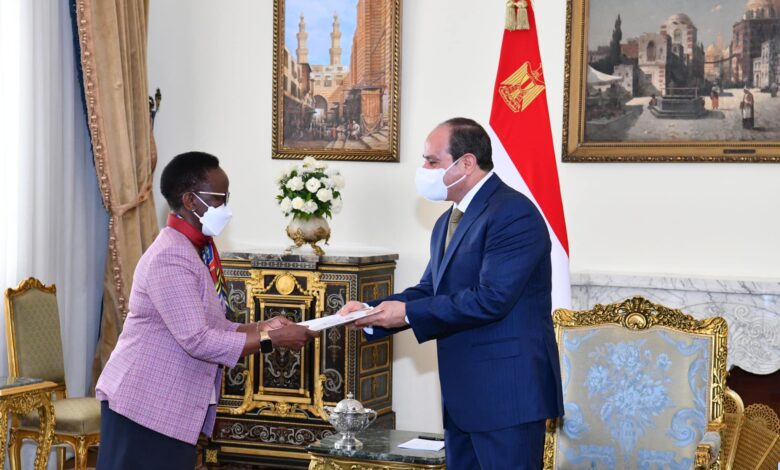
President Abdel Fattah al-Sisi stressed Egypt’s firm position towards preserving its water security and all historical rights acquired in the Nile waters, through reaching a binding legal agreement on the rules for filling and operating the Grand Ethiopian Renaissance Dam (GERD) that preserves the right of current and future generations to the Nile, the main source of water in Egypt.
Sisi’s statements came during his meeting Thursday with the Minister of Foreign Affairs of Tanzania, Liberata Mulamula, in the presence of Egypt’s Foreign Minister Sameh Shoukry, Minister of Housing Assem al-Gazzar, and the participation of the Director of the Africa Department of the Tanzanian Ministry of Foreign Affairs.
The spokesperson for the Egyptian presidency said that President Sisi expressed Egypt’s pride in its historical relations with Tanzania, and praised the momentum in relations between the two countries seen in recent years such as the furthering of joint cooperation in various fields.
The Tanzanian Foreign Minister expressed Tanzania’s great appreciation for its deep relations with Egypt, and its desire to continue upgrading the frameworks of cooperation between the two sides.
She also expressed her country’s interest in benefiting from Egypt’s experience in mega development projects, and referred to developments in joint cooperation with Egypt to establish the Julius Nyerere Dam to generate hydroelectric power in Tanzania.
Foreign Minister Sameh Shoukry also confirmed that the talks he held with the Tanzanian Foreign Minister touched on the GERD.
He said there was understanding from Tanzania regarding the importance of this issue for the Egyptian people, and coordination on the matter is taking place between Egypt and Tanzania within the near future.
Fruitless talks
The project manager of GERD Kifle Horo had admitted in statements to Al-Arabiya TV late last month, that Egypt and Sudan might be affected by the filling operations of the dam, noting that the third filling would be in August and September.
Despite the possible effects on the downstream countries, he ruled out stopping the third filling process, considering it automatic. He stressed that the process of building the Renaissance Dam will not stop for any reason.
Negotiations over the GERD have officially stopped since April 2021, after Egypt, Sudan and Ethiopia failed to reach an understanding before the start of the second filling of the dam, which Ethiopia implemented in July.
Cairo and Khartoum reject Ethiopia’s insistence on filling the dam before reaching a binding agreement on filling and operation.
Egypt, which relies considerably on freshwater from the Nile, has voiced fears that the GERD would negatively impact the country’s water supply.
Egypt has also insisted that measures be put into place to protect downstream countries in case of drought during the dam’s filling process.
Egypt and Sudan say they want a legally binding agreement, while Ethiopia says any pact should be advisory.
Egypt and Sudan consider the dam a threat to their vital water supplies, while Ethiopia considers it essential for development and doubling its electricity production.
The downstream nations fear possible blows to water facilities, agricultural land, and overall availability of Nile water.
Negotiations over the dam between Egypt, Ethiopia, and Sudan have stalled for years, with the three parties ultimately failing to reach any concrete agreement.
The disputed dam is the largest hydroelectric project in Africa, with a cost of more than four billion dollars. The construction of the dam began in 2011.
It is considered to be one of Egypt’s most serious water issues.




